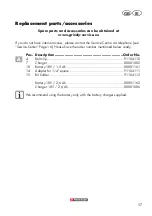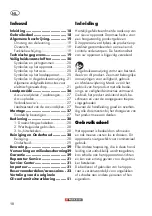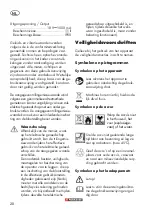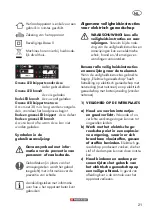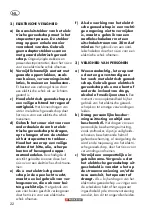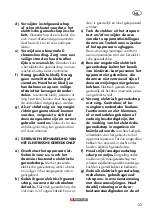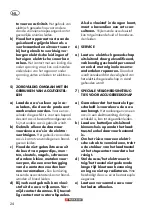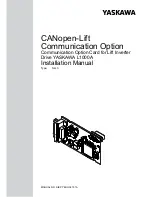
9
IE
GB
c) Disconnect the plug from the
power source and/or the bat-
tery pack from the power tool
before making any adjust -ments,
changing accessories, or storing
power tools.
Such preventive safety
measures reduce the risk of starting the
power tool accidentaIly.
d) Store idle power tools out of the
reach of children and do not al-
low persons unfamiliar with the
power tool or these instructions to
operate the power tool.
Power tools
are dangerous in the hands of untrained
users.
e) Maintain power tools. Check for
misalignment or binding of mov-
ing parts, breakage of parts and
any other condition that may af-
fect the power tool’s operation.
If
damaged, have the power tool repaired
before use. Many accidents are caused
by poorly maintained power tools.
f) Keep cutting tools sharp and
clean.
Properly maintained cutting tools
with sharp cutting edges are less Iikely to
bind and are easier to control.
g) Use the power tool, accessories
and tool bits etc. in accordance
with these instructions, taking into
account the working conditions
and the work to be performed.
Use of the power tool for operations dif-
ferent from those intended could result in
a hazardous situation.
h)
Hold the device by the insulated
gripping surfaces when perfor-
ming work in which the cutting
tool may come into contact with
hidden wiring or its own cord.
Contact with a live wire can also cause
a charge in metal parts of the device
and result in an electric shock.
5) CAREFUL HANDLING AND USE OF
BATTERY DEVICES
a) Charge the batteries only in
chargers that are recommended
by the manufacturer.
Risk of fire if a
charger that is suitable for a specific type
of battery is used with other batteries.
b) In the power tools, use only the
batteries designed for the pur-
pose.
The use of other batteries may
result in injuries and risk of fire.
c) Keep the unused battery away
from paper clips, coins, keys,
nails, screws and other small
metal objects, which could cause
bridging of the contacts.
A short
circuit between the battery contacts may
cause burns or fire.
d) If used incorrectly, liquid may
leak from the battery. Avoid
contact with this. In the event of
accidental contact, rinse off with
water. If the liquid gets into eyes,
seek medical assistance.
Leaking
battery fluid may cause skin irritations or
burns.
6) SERVICE
Have your power tool serviced by
a qualified repair person using
only identical replacement parts.
This will ensure that the safety of the
power tool is maintained.
7) SPECIAL SAFETY DIRECTIONS FOR
BATTERY-OPERATED TOOLS
a) Ensure that the device is switched
off before inserting the battery.
Inserting a battery into a power tool that
is switched on may result in accidents.
Summary of Contents for PDSSA 18 A1
Page 3: ...1 2 3 4 5 6 7 8 9 10 15 12 11 13 14 ...
Page 48: ...48 ...
Page 50: ...50 ...
Page 52: ...52 2015 03 05 rev02 op ...

















